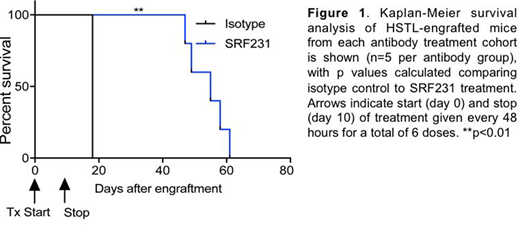Abstract
Outcomes for patients with aggressive T-cell lymphomas (TCLs) remain dismal. Monoclonal antibodies (mAbs) that inhibit engagement of the "don't eat me" signal CD47 with SIRPα on myeloid cells may induce phagocytosis and have exhibited promise in multiple cancers. We dissected the role of CD47 blockade in opsonization and phagocytosis-induction through Fc-Fc gamma receptor (FcγR) interactions. CD47 was expressed at higher levels on 22 TCL cell lines by flow cytometry compared to quiescent T cells from 10 healthy donors (mean fluorescent intensity, 176.9 versus 69.85; Welch t-test p=0.002). We determined tumor cell-specific protein expression of CD47 by calculation of H scores in a tissue microarray (TMA) of 68 primary TCLs. The common subtypes (PTCL-NOS (n=16), AITL (n=19), and ALCL (n=12)) each had heterogeneous CD47 expression that was not associated with progression-free or overall survival. We utilized B6H12, an anti-CD47 mAb to assess apoptosis, antibody-dependent cell mediated-cytotoxicity (ADCC) and complement-mediated cytotoxicity (CDC) of TCL cells (HuT-78, HH, Myla, SU-PM2, KIJK, MAC-2A, SMZ1 and K-299) and no increase was observed except for ADCC by murine FcγRIII-expressing engineered Jurkat cells. Upon addition of B6H12 or SRF231, a fully human IgG4 mAb against CD47 that is currently in a Phase I clinical trial (NCT03512340), phagocytosis of CFSE+ TCL cells with human monocyte-derived macrophages (hMDMs) and murine bone-marrow derived macrophages (mBMDMs) was increased. In contrast, induction of phagocytosis of resting T cells from healthy donors was tested using B6H12 and no increase was observed (22.7 and 19.5%). A flow cytometry-based receptor occupancy assay demonstrated a linear correlation between receptor binding and phagocytosis induction in Jurkat T-cell lymphoblastic leukemia cells. hMDMs failed to induce phagocytosis of TCL cells with F(ab')2 portion of B6H12 suggesting complete dependence on Fc receptors. In contrast, mBMDM-mediated phagocytosis of TCL cells with the F(ab')2 portion of B6H12 (mean, 21.5%) was increased compared to negative control but reduced compared to full length (mean, 33.4%), suggesting both Fc-dependent and Fc-independent mechanisms. mBMDMs from FcγR knockout mice demonstrated a statistically significant decrease in phagocytosis (compared to wild-type mBMDMs) of Jurkat, HuT-78, MAC2A and K-299 cells with B6H12, confirming a role for Fc-FcγR engagement. Phagocytosis of tumor cells during CD47 blockade may depend on the ability of SLAMF7 to interact with the integrin Mac-1 (Chen J, Nature 2017). Phagocytosis assays of TCL cells with mBMDMs from Mac-1 knockout mice with full length and F(ab')2 B6H12 demonstrated a reduction in phagocytosis using Mac-1 knockout macrophages (compared to wild-type) only with full-length B6H12. Thus, the Mac-1 contribution to phagocytosis induced by B6H12 in this context is Fc-dependent. We tested SRF231 in vivo using patient-derived xenograft (PDX) models of systemic hepatosplenic (HSTL), transformed cutaneous, and NKTCL. After 10 days, SRF231-treated mice had remarkable reductions in tumor burden compared to untreated mice, across multiple compartments. SRF231 treatment resulted in prolonged survival despite a short course of therapy (Figure 1). Bone marrow from xenografted mice, collected at day 11 post-treatment with SRF231, had significantly increased cytokines known to promote monocyte recruitment. Ex-vivo phagocytosis assays using mBMDMs and hMDMs, enhanced engulfment of HSTL, T-PLL and anaplastic large cell-lymphoma PDX harvested cells upon exposure to SRF231. Finally, we observed that in our HSTL PDX model, depletion of macrophages with clodronate completely abrogated the antitumor efficacy of SRF231 while depletion of neutrophils with anti-Ly6G Ab had no effect, highlighting macrophages as the essential effectors of phagocytosis in this context. In summary, monoclonal antibodies that disrupt CD47-SIRPα have striking in vitro and in vivo preclinical efficacy but require interactions with human FcγR on macrophages to maximize efficacy.
Peluso:Surface Oncology: Employment, Equity Ownership. O'Connor:Surface Oncology: Employment, Equity Ownership. Paterson:Surface Oncology: Employment, Equity Ownership. Holland:Surface Oncology: Employment, Equity Ownership. Weinstock:Astra Zeneca, JAX, Samumed, Regeneron, Sun Pharma, Prescient: Patents & Royalties; Travera: Equity Ownership; Novartis: Consultancy, Research Funding; Novartis, Astra Zeneca, Abbvie, Aileron, Surface Oncology, Daiichi Sankyo: Research Funding; Genentech/Roche, Monsanto: Consultancy; Novartis, Dragonfly, Travera, DxTerity, Travera: Consultancy.
Author notes
Asterisk with author names denotes non-ASH members.


This feature is available to Subscribers Only
Sign In or Create an Account Close Modal